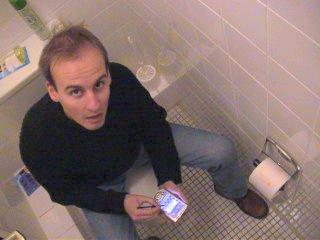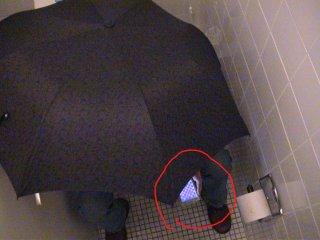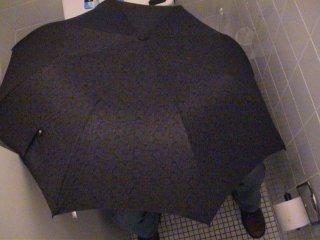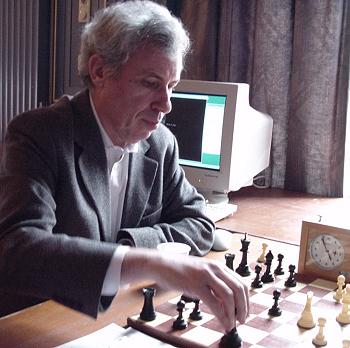
In Lampertsheim the arbiter announced the disqualification of a
player before round seven. Volker Widmann explained what had
happened: "In the sixth round a player came to me and said he
suspected his opponent, W.S. from L., was using illicit aids during
the game. He often left the board for protracted periods of time to
go to the toilet, even when (especially when) it was his turn to
play. He had done this in earlier rounds against other players as
well.
I watched W.S. and noticed that he played a number of moves very
rapidly and then disappeared in the toilet. I followed him and could
hear no sound coming from the stall. I looked under the door and saw
that his feet were pointing sideways, so that he could not have been
using the toilet. So I entered the neigbouring stall, stood on the
toilet bowl and looked over the dividing wall. I saw W.S. standing
there with a handheld PC which displayed a running chess program. He
was using a stylus to operate it.
I immediately disqualified the player. When confronted he claimed
that he was only checking his emails, so I asked him to show me the
computer, which he refused to do. There are witnesses for my
investigation in the toilet, and we will ask the chess federation of
our state to ban the player from playing in other tournaments."
A full report on the Lamprechtsheim Open with games and tables is
available at http://www.schachland.de/turniere.htm
Editorial comment
Many great ideas in the history of mankind were born in the
shower. Or in the toilet. But computer-assisted ideas during chess
tournaments are frowned upon. It is immoral and unethical to use our
hand-held program to find a refutation to the combination your
opponent has just played. It is even more dishonourable to use the
little device to consult the giant online database that is
maintained by ChessBase in Hamburg and contains over two million
games. Or the truly gigantic online openings tree, where the program
gives you full statistics on each move. That is just plain
wrong!
However, if in spite of our admonitions anyone should decide to
actually use Pocket Fritz to enhance his performance, the least he
or she can do is to avoid getting caught. The manual clearly give
instructions on how to do this. We bring you a summary extract with
pictures taken by our German ChessBase colleagues.

Now this is the wrong way of going about it. Obviously the
cheat has not protected himself from the prying eyes of arbiters who
may look over the top of the stall.

This is much better. The use of an umbrella is highly
recommended, but the cheat is still getting it wrong: the pocket PC
screen is visible to an arbiter looking into the stall from
above.

Correct! The arbiter will simply assume that the player is
protecting himself from an unexpected downpour of rain.
Note that you should restrict your visits to the toilet to three
or four during a game. Going to the loo after every single move will
doubtless raise suspicion, and the arbiter may in fact demand that
you do not take the umbrella with you the next time.

In order to conceal your Pocket Fritz during a chess game third
party vendors have come up with some interesting solutions. We have
tested the elegant winter hat shown in the above picture and are
able to confirm that it completely conceals a Pocket PC with the
program installed on it.
With this hat and an umbrella nobody will look twice when you
slip into the toilet to check the position with your Pocket
Fritz.
André Schulz/8.1.2003
Dentophonics
Soon after publishing the above article we received the following
missive from David Levy, the President of the International Computer
Games Association (ICGA), one of the
sanctioning bodies of the Kasparov vs Deep
Junior match.

David writes:
No need to visit the toilet! I suggest that Chessbase should
start a new service to modify fillings in teeth to receive sound
signals. You will recall that Fischer had all his fillings removed
because he knew the Russians were beaming waves at him through his
teeth. Presumably they were advising him to play weak moves.
There would be an inital dental charge and then a monthly
subscription. The amount of the subscription would depend on whether
a player wanted to receive only the best moves, or the moves and
current score for the position, or some other service such as all
the openings data for the opponent from the current position. The
subscription could also vary according to the current ranking of the
program being accessed.
Revenue streams would be:
- Commission on the dental fees.
- Subscription income for receipt of moves etc.
- A percentage of prize money won.
- Bonus payments when a subscriber gets the FM, IM or GM title
(etc.)
For suggesting the idea I should receive 5% of Chessbase's net
income from the scheme. Please ask your patent agent to resigister
this idea. I suggest we launch the service in New York later this
month – they have plenty of dentists there.
Nice one, Centurion
From Vishy Anand we received the following short email: "Great
article on Alwermann II. Nice one centurion, liked it."
For the uninitiated: Alwermann was a German chess player who
was caught some years ago getting moves via radio transmission
from Fritz. He won a GM tournament in that way. The centurion is
from the Life of Brian, where an ancient prisoner named Ben
has deep admiration for his Roman captors. The scene ends with
this exchange:
Centurion: Pilate wants to see you!
Brian:
Pilate? What does he want to see me for?
Centurion: I
think he wants to know which way up you want to be crucified.
Ben: Oh, ha ha ha haa! Ha haa! Nice one, Centurion.
Like it. Like it.
Centurion: Shut up!
Ben:
Right. Right. (Reverentially) Terrific race, the Romans.
Terrific.
Here's
a transcript of the whole scene.



